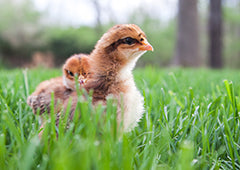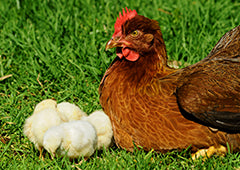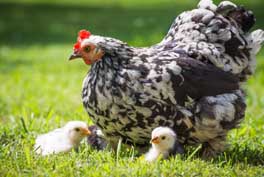If you’re thinking about breeding some beautiful newborns from your backyard flock (or just want some fertilised eggs), then there are a few things to consider before embarking to get the best possible result. Ensuring your well prepared and knowledgeable will help your new flock be healthy and happy from the get-go!
What are some things I need to think of before I start breeding my own chickens?
Breeding baby chickens may seem like a great idea - and it is an incredibly rewarding one. But being sure that you've prepared fully for what needs to happen after hatching is essential.
Some things all people who are thinking of embarking on chicken breeding should consider (unless you’re just after fertilised eggs and don’t want to hatch them) are:
- Do you have enough space for your newborn chicks? They can’t stay in with your fully-grown flock, and will need a separate brooder space. This is because they can pick up diseases their little immune systems can’t cope with.
- In every new batch of hatchlings there will most likely be a surplus of males - roosters are very noisy creatures not often allowed in residential backyards. Unfortunately, sometimes people have to humanely and appropriately find a solution.
- There are lots of additional costs that come with breeding - a new brooder, additional feed, not to mention your attention.
If you still feel ready to breed from your beautiful flock, read on!
Which chickens should I choose to mate?
In order to determine the best chickens to breed from, you should do a thorough assessment of the contenders.
Here’s a list of things to look out for when you are choosing the chickens you’re going to breed from:
- Weight: the chicken shouldn’t be overweight, or underweight. You can check this by gentle feeling for their breastbone, which should be detectable under a thin layer of fat.
- Overall appearance: it’s a good idea to give your candidates the once over from head to toe, to make sure there aren’t any problems or illnesses. Our ‘Healthy Chicken Checklist’ article runs you through all the things to look out for!
If your chicken does have some health difficulties, it really is best not to breed from them as you may pass these ailments on to your newborns. A flock of unhealthy chickens is a handful! Breeding from the strongest, healthiest looking birds in your flock will help keep your flock thriving.
How to prep your birds for breeding
Keeping your chickens healthy and fit is crucial in the lead up to egg-fertilisation. Ways you can help prepare your chickens for mating include:
- Breeders ration - you can buy feed made especially for breeding birds, which keeps them healthy and fighting fit, helping them to perform better. Start feeding your chickens the breeder ration 6 weeks before you actually want your eggs to start becoming fertilised.
- Proper nutrition, fresh water and exercise to keep them fighting fit.
How do chickens mate?
Knowing how your chicken will mate is key to successful breeding. It's all about timing, health and preparation!
The rooster's productive organ is called a papilla and it's just a small bump inside his cloaca. To mate, a rooster will climb onto the back of a hen, stand on her back and use his wings to balance whilst touching his cloaca with hers. It's known as a cloacal kiss and can take a matter of seconds so you might not even notice it happening!
When should I mate my chickens?
The male’s fertility is affected by sunlight - therefore breeding in the summertime and getting baby chickens early in the year is your best bet. Like egg-laying, a males fertility will decrease as the amount of light during the day also decreases - so aim for the summer months!
Breeding new baby chickens is very rewarding - but as a breeder, you have a responsibility to do your best to ensure that new hatchlings are born from the healthiest parents possible.
Ensure that you have enough room to separate the hatchlings and the older birds with a brooder - we sell one that has all the equipment you need to give the new babies the best start in life.
Whether you decide to breed your birds or buy fertilized eggs to start a flock, there is so much to learn about bringing new life into the world. With the right knowledge and advice, it can be a joyful and eggstraordinary experience for the whole family. Nothing compares to seeing fluffy little hatchlings peck out of their shells. Getting to this perfect moment does come with a fair few challenges and risks which can be stressful and overwhelming, especially without the right information.
This is why I recommend our friends at Chickenpedia to all of my readers. They have created the brilliant Hatch A Plan course to help you successfully incubate and hatch happy and healthy chicks. Their course offers valuable advice to ensure you develop your knowledge to avoid tragic disasters, as these little ones can be so sensitive to temperature! You can learn about the conditions and equipment needed to confidently bring new life into the world.
As chicken keepers, we want to do an eggcellent job when caring for our feathered friends. Many chicken keepers struggle to handle chicken health or behaviour issues, especially in the first few years of having a flock. Chickenpedia have comprehensive online courses on everything you didn’t know you need to know and then some more! From raising baby chicks to feeding and behavior, you’ll find beginner-friendly courses that’ll give you the knowledge and confidence to successfully look after your chickens for years to come.
These courses are exclusive to members only, so flock to Chickenpedia today!


















